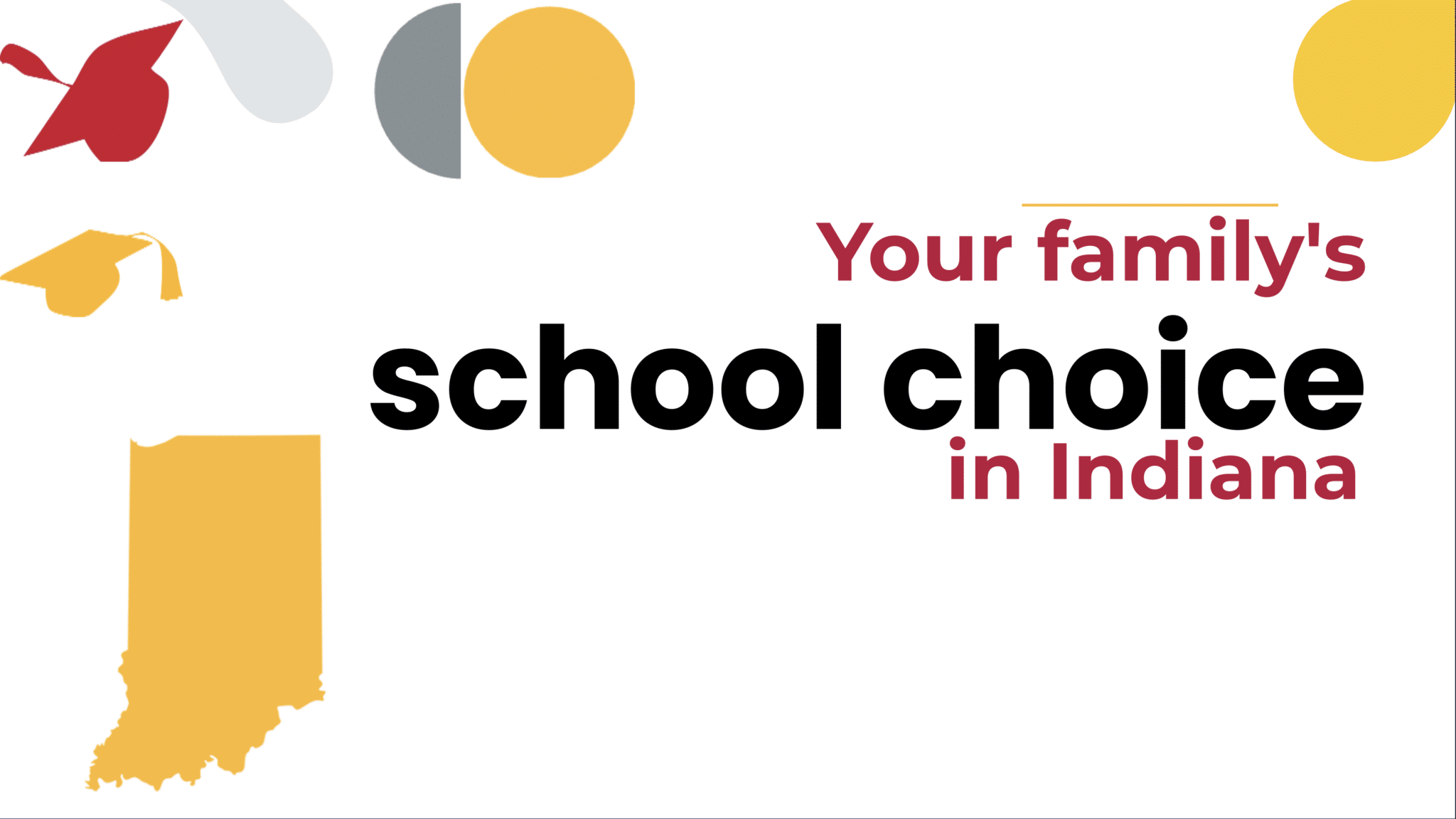Choosing a school? You’ve got options.
Choosing where your child goes to school is one of the biggest decisions you’ll make as a parent, but you’re not alone in it. Thousands of Indiana parents make K-12 education decisions each year. You can do it! And remember, each child is unique. So, the “best” school for your child may be different than the “best” school for your neighbor’s child.
If you live in Indiana, you have access to several types of schools. Understanding these options is the best starting point for finding a great school for your family. In short, you can choose from traditional public schools, public charter schools, public magnet schools, private schools, online learning, and homeschooling. We’ll also talk about microschooling and mix-and-match learning!
Looking for special education options? You can learn what special education services are available in Indiana at the Ultimate Guide to Special Education.
*For the 2024-2025 school year, students in grades 3-8 who qualify for free or reduced lunch and score “below proficient” on standardized tests may be eligible for a $1,000 grant to spend on tutoring. Learn more at Indiana Learns.
*Also, a bill passed in 2023 launches a Career Scholarship Account program to expand work-based learning for 10th-12th graders across the state, no matter their school choice. The program provides $5,000 grants for approved “earn-and-learn opportunities.” Learn more in our explainer.

- Traditional Public Schools
- Public Charter Schools
- Public Magnet Schools
- Private Schools
- Online Schools
- Homeschool
- Microschooling
Indiana Traditional Public Schools
Most Indiana children (80.1%) attend traditional public schools, which represent the most well-known school choice. Traditional public schools are operated by school districts, free to attend, open to all students, and funded by taxpayers. On average, Indiana spends $11,538 per public school student each year. You can search your school’s spending and that of nearby schools at Project Nickel.
Each state has its own open enrollment rules. Open enrollment refers to whether parents can send their children to any public school, regardless of where it is located. In Indiana, parents have restricted open enrollment. What this means is that Indianapolis Public Schools requires schools within the district to allow transfers. And in other districts, students can request to transfer to any public school of choice, provided the school has a policy allowing for open enrollment. It’s worth noting that some districts may require tuition fees for transfer students. However, a new law passed in 2024 may eliminate fees for out-of-district transfers starting July 1.
For a real-world example, check out Noblesville Schools’ transfer process.
In particular, parents can request that their child transfer to another district if there are crowded conditions at their current school or if another school district offers curriculum important to their child’s vocational aspirations. Open enrollment is a valuable form of public school choice, giving parents more public options for their child. If you would like to participate in open enrollment, contact your local district to learn more.
Find out more about public schools in your state at the Indiana Department of Education.
Indiana Charter Schools
Besides traditional public schools, charter schools are another free, public school option. In Indiana, 4.5% of all K-12 students attend a public charter school. Charter schools are public schools that are allowed the freedom to innovate while being held accountable for student achievement. The school’s charter describes what unique community need the school fills, and the school may be authorized by a governing body, a college, or the Indiana Charter School Board.
For example, one charter school we interviewed, Career Academy at South Bend, uses a project-based learning style to engage 6-12th grade students in highly technical building projects. “We emphasize the high-demand, high-wage jobs in our region: construction, engineering, computer science, biomedical and health sciences,” Career Academy’s Superintendent Alex Hammel told us. “We’ve got students doing internships at manufacturing companies and all these places. Employers are absolutely dying for talented students, so this is a great place for them. And the students are grateful because they’re having these amazing opportunities before they’re even out of high school.”
Indiana opened its first eleven charter schools in 2002. Today, there are more than 110 charter schools across the state, providing an important tuition-free education option for families. If there are more families seeking admittance to a charter school than there are seats, a lottery system (like drawing random names out of a hat!) is usually used to determine admittance.
The National Alliance of Public Charter Schools has ranked Indiana the top state in the nation for having strong public charter school laws. Learn more about Indiana’s charter schools at the Indiana Charter Schools Network.
Indiana Magnet Schools
Additionally, you can choose magnet schools. These free public schools allow kids to focus on specialized themes, like International Baccalaureate, Montessori, or the performing arts. Indiana has several magnet schools families can consider. In the Indianapolis Public School district, for example, there are more than 15 magnet elementary and middle schools. Meanwhile, the South Bend Community School Corporation has more than 20 magnet schools or programs, and Fort Wayne Community Schools has five magnet schools. If your child learns best by focusing in on a subject he or she is passionate about and you have a magnet school in your area, this may be a good choice for you.
Indiana Private Schools
You can also consider private schools. Indiana’s private schools are nonpublic schools that charge tuition and have more freedom in curriculum and structure. Many but not all private schools offer education in a faith-based environment. There are about 800 private schools across the state of Indiana. The average tuition for private schools in the state is $5,881 for elementary schools and $10,280 for high schools.
Thanks to recent expansions, 97% of Hoosier students are now eligible for a scholarship to help with private school expenses.
For example, more than 69,270 students participate annually in Indiana’s Choice Scholarship, which provides vouchers for private school tuition. This program was expanded in 2023; now, nearly all students in the state are eligible to apply. You can read more about it in our full explainer.
Plus, in 2022, Indiana kicked off an Education Savings Account program to provide flexible educational funding for students with special needs. This program also expanded in 2023 to allow more families to participate.
Parents in Indiana also have the option of taking tax deductions for private school expenses. Or, through Indiana’s Tax-Credit Scholarship program, low and middle-income families can apply for tax-credit scholarships for private school tuition.
Currently, 6.9% of all K-12 students participate in a private school choice program.
Learn more at the Indiana Non-Public Education Association and Private School Review: Indiana.
Indiana Online Learning
Free, full-time online learning options for Indiana students include Indiana Connections Academy, Indiana Digital Learning School, Indiana Gateway Digital Academy, Phalen Virtual Leadership Academy, Move-Up Academy, Indiana University High School, and Achieve Virtual, the only public virtual statewide K-12 school operated by a local Indiana school district. Other district online learning programs serve specific grades or local students only. Students in grades 7-12 can also consider Hoosier College and Career Academy (formerly Insight School of Indiana), while students in grades 6-12 can consider Indiana Connections Career Academy.
Families who qualify for the state’s voucher program may be able to apply those vouchers to two newly-accredited private virtual schools, GEO Focus Academy and Faith Prep.
A local, fee-based option Indiana students can choose is IU High School, a fully accredited online private high school run by Indiana University. Students at IU High School can take courses to supplement their educational experiences in brick and mortar institutions, or students may pursue a high school diploma online full-time. IU High school was founded in 1925, so it’s been allowing students to attain a high school diploma at a distance for nearly a century!
Finally, some schools will cover costs for students to take supplemental high school courses through Indiana Online, which partners with more than 300 schools statewide. Many families choose to use Indiana Online for summer school courses.
To read more about online learning in Indiana, including hybrid schools and single-district online offerings, check out the Digital Learning Collaborative’s state profile.
Indiana Homeschooling
Finally, homeschooling, the process of parents educating students at home, is permitted in Indiana and all other states. As technology and choices have spread in Indiana, homeschooling is an increasingly popular choice with more support than ever.
In Indiana, 5% of all K-12 students are homeschooled. The state does not require notice of your intent to homeschool. However, it is recommended that you formally withdraw your child from their current school so your student is not marked truant. If you decide to return to public school, schools may make placement decisions based on what grade the parent feels is appropriate, or use other assessments to determine placement.
You are not required to teach specific subjects or use specific standardized tests if you choose to homeschool in Indiana. Homeschool students may be eligible to participate in classes, sports, or activities at local public schools, though restrictions may apply – you can reach out to your district about their policies! Additionally, homeschoolers are eligible to receive some special education services from Indiana school districts.
Indiana offers a tax deduction of up to $1,000 per child for homeschooling. For more, check out a great how-to about homeschooling in Indiana.
Indiana Microschools and Mix-and-Match Learning
Today, some Indiana families are mixing and matching school options to come up with new ways to personalize education. Microschools are one of these ways. A microschool refers to students gathering together in a small group – with adult supervision – to learn, explore, and socialize. Microschools can take a variety of shapes and legal forms, from homeschoolers coming together at an enrichment center to a private school committed to small classrooms. What microschools share in common is a commitment to small-group learning and close-knit relationships, along with an emphasis on children as individual learners.
Here are a few examples of microschools and related resources in Indiana:
In Indianapolis, a local nonprofit called the Mind Trust has facilitated learning hubs to support students.
Redeemer Classical School in Fort Wayne is a Christian microschool and center for family-based education.
There are three Wildflower Montessori microschools in Indiana, in South Bend, Fort Wayne, and Clarksville.
Chesterton Academy of St. Scholastica in Fort Wayne is part of the Chesterton Schools Network, providing a classical catholic education.
Streams of Hope is a private Christian school in Fort Wayne that offers a la carte classes, hybrid classes, and homeschool resources and support.
All 10-12th grade students, including homeschoolers, are eligible to apply for the state’s new Career Scholarship Program. The program allows students who create a graduation plan to receive a flexible grant of about $5,000 for approved “earn-and-learn opportunities.”
Remember, microschooling is more a mentality than a specific legal distinction in most cases. Often, a family participates in a microschool while legally homeschooling, or being enrolled in a private or online school.
Search for Schools Near Me
Microschooling and Mix-and-Match Learning
How can it empower parents and help kids achieve their dreams?
7 Step Guide
Tips to help you find a school where your daughter or son will learn, succeed, and be happy.
Education Resources for
Indiana Parents
For additional information about school choices in
Indiana, visit these resources:
Every state is different when it comes to school choice options.
Sign up below to get a detailed comparison:
"*" indicates required fields
